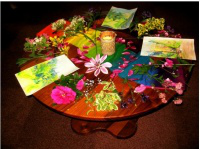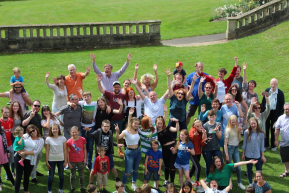Canticles and Compost - a Catholic People’s Week

Decorated altar
When you read the Canticle of the Sun every day during a week of evening prayer, you can understand why St Francis was thought to be crazy by many of his contemporaries. His praise of creation, thanking God for the elements of earth, air, fire and water as well as the massive variety of living things, must have struck them as strange. Wasn’t their Catholic faith more about fleeing the world than enjoying and appreciating it? Preaching to the birds probably underlined their concerns about Francis.
Well, I’ve just returned from a Catholic People’s Week ‘Canticles and Compost’ where, at one liturgy in the lovely chapel of Ammerdown in Somerset, 30 of us passed around soil and water, giving thanks to God for both. To round off we then moved to a table outside where we actually planted little shoots of beech tree and salad seeds to take back to our own gardens. And we listened to the little blackbird that likes to hop around that table and meet Ammerdown’s guests. How would we be regarded by many in the Catholic Church? The out-going Shrewbury Diocesan Justice and Peace fieldworker, whose sudden redundancy after 19 years in the post was confirmed this week, was accused of pantheism in recent months for raising awareness of environmental justice. Are those of us who feel the presence of God in the natural world, and indeed regard the Earth as a bio-spiritual entity, also to be shot down.
Our chaplain for the week was the theologian Thomas Cullinan, a monk priest of the Liverpool Archdiocese. During our Eucharistic liturgies we used his own homemade bread, the fruit of the Earth and work of human hands. He urged us to reflect not just upon the human story but on humanity’s place in the whole story of creation. He lamented “the complete lack of humility” towards the natural world and called for “a totally new agenda for human society”. For the past two millennia those who are heirs to the biblical and European heritage have structured our faith cosmology on the origin story found in the first book of the Bible, the book of Genesis. The Genesis account implies that all the life forms we find on the planet were there from the beginning in the form we find them today. In fact, science informs us that the story of Creation goes back to the big bang of 13.7 billion years ago. As we now contemplate how the Earth emerged through countless evolutionary transformations since energy, light and time burst forth from the fireball, we ought to be filled with a new sense of awe and wonder and greater appreciation of other species of animals and plants, as well as our links to them. It is critically important for our Church to grasp the present opportunity to integrate the scientific, the religious and the moral and give our human story a broader context and a spiritual foundation.
But why does this matter? Mary Colwell, a former Catholic producer of wildlife programmes with the BBC Natural History unit, opened her presentation at the week by saying that “when I went to Church on Sunday, it was as if that world never existed”. We need to see the Earth in its context of the Universe, she said, “for as far as we know this is the only planet that sings”. She gave plenty of examples of how Earth systems are unappreciated and degraded: about 30 square miles of Borneo’s rainforests are felled daily for palm oil, a devastating loss of habitat for orangutans and other species; and as surface fish get rarer due to destructive over-fishing, deep sea fish such as the amazing long-living Orange Roughy are turned into commodities on supermarket fish counters, with only their taste mattering to human society. “No animal is spared in our hunt for food” said Mary. In our time we are seeing the greatest extinction of species since the extinction of the dinosaurs, yet we hear virtually nothing about it in our churches.
It was interesting that when the participants discussed the following question in groups: What has your church taught you about humanity’s place in Creation? One person could be heard across the room responding “absolutely nothing!” I’m with Thomas Cullinan. “This is not a fringe matter for Christians” he said, encouraging us to examine the work of Teillard de Chardin, Thomas Berry, Sean McDonagh, Mary Grey and Elizabeth Johnson to convert our minds and hearts to the good of the Earth. Humans have been around only for 0.0001 percent of the history of the Earth – and yet we have contributed to massive changes for every other species. According to Thomas Berry in his book, The Great Work, humans are challenged is to carry out a transition from the period of human devastation of the planet to a period when humans would be present to the planet in a mutually enhancing manner. Responding to the cry of the Earth and the cry of the Poor ought to be at the centre of Christian discipleship and Mission today.
So, at the Catholic People’s Week I was impressed by the engagement with serious issues, such as sustainable development in the light of the Rio+20 Earth Summit, and examining how our notion of ‘sin’ is changed by climate change and other environmental crises of our time. A whole session looked at action to conserve the environment and we monitored our own footprints on this Earth. There was a lengthy discussion about the difference between Optimism and Hope in relation to environmental threats – the latter is more than just expecting everything to be well; it is actually playing a part in meeting goals knowing that the Spirit of God is with us. All our liturgies were participatory and lay people helped prepare them. Could such a serious engagement happen within the parish model? Justice and Peace and LiveSimply groups and ecumenical Christian Ecology Link groups do bring people together to develop ways of living more justly and sustainably. But I would like to pay tribute to Catholic People’s Weeks and initiatives like them.
The ‘Canticles and Compost’ week was an important opportunity for a deeper level of formation, particularly lay formation. Unlike clergy, most lay people have to pay out for formation, but it is wonderful that hundreds of people each year give priority to formation in social justice and sensitivity to creation offered in the weeks. And participants were clearly people involved in other caring and voluntary work such as marriage guidance, hospice support and food banks. Note that those who run these weeks do so without remuneration, and you can gage the commitment of those involved in developing their faith.
Running beneath the radar of the mainstream Church, this was one of eight Catholic People’s Weeks organised during 2012. Three large family weeks are due to take place in August. Around 350 weeks have been run since 1945, when the three founders - Reg Trevett, a Taunton teacher; Dom Ralph Russell, a monk at Downside Abbey; and John Todd, a conscientious objector who worked on land near Downside during the war and was a co-founder of the religious publishing house Darton Longman & Todd – decided to create opportunities for lay Catholics to study theology and deepen their understanding of faith. After the boost given to lay formation by Vatican II, the weeks became ever more popular. The mixture of talks and activities, prayer and socialising, in a community setting is clearly popular with many Catholic families and individuals. Catholic People’s Weeks are also a great service to a Church that says it wants lay involvement in its mission. They warm the heart and spirit that Catholic community is thriving.
For more information see: www.catholicpeoplesweeks.org.uk


















